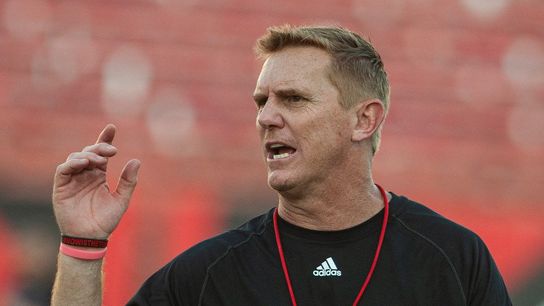When Blake Anderson strode on stage during the AFCA's general session on Monday, every one of the 5,000-plus in attendance had an idea what he was going to talk about. And he did. For a time. Anderson shared largely the same message he has since his wife Wendy's untimely passing in August -- one of gratitude for their 27 years of marriage, of the opportunity to show God's goodness, of the outpouring of love and support from the coaching community.
But that wasn't the main topic of his talk.
Generally, the idea of the AFCA's main hall talks is to get one of the game's more established names to give his slant on a topic everyone in the coaching profession from middle school to the NFL can bring home with them and apply to their own jobs. And, hopefully, Anderson was the only coach in the room Monday forced to endure his family's particular tragedy.
What Anderson did spend most of his hour talking about is something every coach, every person walking the planet, has to wrestle with every day of their lives.
Anderson's coaching career is actually split into two chapters, and there is a reason for that.
After playing quarterback at Baylor and Sam Houston State in the late 1980s and early 90s, Anderson entered the coaching profession as a graduate assistant at Eastern New Mexico in 1992. "It's not the edge of the world," Anderson said of ENMU, "but you can see it from there."
He quickly rose the professional ladder, becoming an offensive coordinator before his 30th birthday, and by age 31 he was the co-offensive coordinator and wide receivers coach at Middle Tennessee, in 2002.
And as Anderson's professional life rose, his personal fell apart.
When Anderson was home, he was hardly, actually, home. "I was the win at all costs personality," he said. "The people that were praised were the guys sleeping in their offices. An obsessive work ethic becomes destructive."
At one point, Anderson said, as Wendy drove his oldest son by the stadium he was coaching in at the time, the boy pointed out the window and said, "That's where Daddy lives."
"I was not a husband and I was not a father," Anderson said. "I was a coach who had a family."
And that was when he was at home. On the road, Anderson became a full-time recruiter, in his words: of players by day, and of women at night.
"I told myself I could be one guy at home and another guy on the road, and the two would never meet," he said. Like any person trying unsuccessfully to live two lives inside one body, the only person Anderson fooled was himself. A decade in, his marriage had crumbled. Wendy had packed her bags and was prepared to leave.
"I looked in the mirror and I was ashamed of who I was," he said. "I left work, I went home and I begged my wife for a second chance."
Anderson walked away from his job on June 1, 2005 and joined his father's business, selling life insurance while regaining his wife and his children's trust. He spent the 2005 and '06 seasons out of the game and wasn't looking to get back in when Rickey Bustle called with a job offer.
After prayerful consideration, Anderson rejoined the coaching profession as Louisiana-Lafayette's offensive coordinator and quarterbacks coach. The rest is history: six successful seasons on Larry Fedora's staffs at Southern Miss and North Carolina, then six seasons and counting as the head coach at Arkansas State. Anderson is a better coach now than he was before because he's a better husband and a better father than he was before.
"We proved you can put God first, you can have balance, and you can be successful," he said. "We built a culture that I'm proud of."
Anderson's faith in God and his dedication of his life to Jesus Christ didn't stop cancer from taking Wendy's life. God never promised to be a forcefield protecting believers from suffering, but a platform on which to stand when hardships inevitably arrive.
"For the first time in my life, I feel like I have true perspective," Anderson said. "I feel like I have true perspective. I want those around me to know Christ, and I don't want to waste a second on things that don't matter."
As Anderson finished his talk, he again thanked the coaching profession for the support it had and continues to offer his family during their ongoing time of suffering, and then he exited the stage to an immediate and thunderous standing ovation. It's the first I can remember in eight years of attending the AFCA convention.
